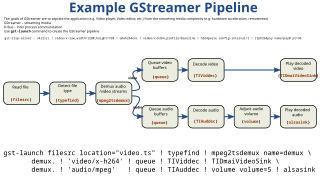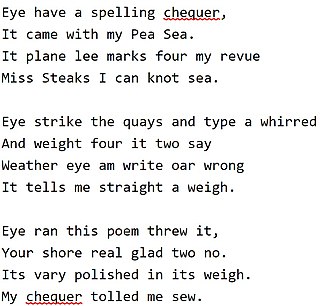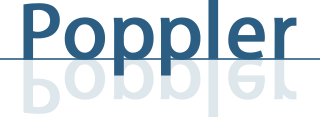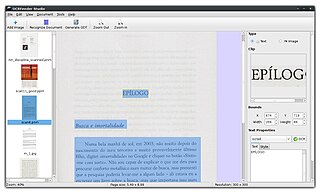Related Research Articles

AbiWord is a free and open-source word processor. It is written in C++ and since version 3 it is based on GTK+ 3. The name "AbiWord" is derived from the root of the Spanish word "abierto", meaning "open".

gedit is a text editor designed for the GNOME desktop environment. It was GNOME's default text editor and part of the GNOME Core Applications until GNOME version 42 in March 2022, which changed the default text editor to GNOME Text Editor. Designed as a general-purpose text editor, gedit emphasizes simplicity and ease of use, with a clean and simple GUI, according to the philosophy of the GNOME project. It includes tools for editing source code and structured text such as markup languages.
In computing, a loadable kernel module (LKM) is an object file that contains code to extend the running kernel, or so-called base kernel, of an operating system. LKMs are typically used to add support for new hardware and/or filesystems, or for adding system calls. When the functionality provided by an LKM is no longer required, it can be unloaded in order to free memory and other resources.

GStreamer is a pipeline-based multimedia framework that links together a wide variety of media processing systems to complete complex workflows. For instance, GStreamer can be used to build a system that reads files in one format, processes them, and exports them in another. The formats and processes can be changed in a plug and play fashion.

Scanner Access Now Easy (SANE) is an open-source application programming interface (API) that provides standardized access to any raster image scanner hardware. The SANE API is public domain. It is commonly used on Linux.

In software, a spell checker is a software feature that checks for misspellings in a text. Spell-checking features are often embedded in software or services, such as a word processor, email client, electronic dictionary, or search engine.
GNU Aspell, usually called just Aspell, is a free software spell checker designed to replace Ispell. It is the standard spell checker for the GNU operating system. It also compiles for other Unix-like operating systems and Windows. The main program is licensed under the GNU Lesser General Public License, the documentation under the GNU Free Documentation License. Dictionaries for it are available for about 70 languages. The primary maintainer is Kevin Atkinson.
MySpell is a spell checker that was formerly included with OOo Writer of the free OpenOffice.org office suite.
NX technology, commonly known as NX or NoMachine, is a remote access and remote control computer software allowing remote desktop access and maintenance of computers. It is developed by the Luxembourg-based company NoMachine S.à r.l. NoMachine is proprietary software and is free-of-charge for non-commercial use.

GDK is a library that acts as a wrapper around the low-level functions provided by the underlying windowing and graphics systems. GDK lies between the display server and the GTK library, handling basic rendering such as drawing primitives, raster graphics (bitmaps), cursors, fonts, as well as window events and drag-and-drop functionality.

Evince, also known as GNOME Document Viewer, is a free and open-source document viewer supporting many document file formats including PDF, PostScript, DjVu, TIFF, XPS and DVI. It is designed for the GNOME desktop environment.
Hunspell is a spell checker and morphological analyser designed for languages with rich morphology and complex word compounding and character encoding, originally designed for the Hungarian language.

Poppler is a free and open-source software library for rendering Portable Document Format (PDF) documents. Its development is supported by freedesktop.org. Commonly used on Linux systems, it powers the PDF viewers of the GNOME and KDE desktop environments.

GTK is a free software cross-platform widget toolkit for creating graphical user interfaces (GUIs). It is licensed under the terms of the GNU Lesser General Public License, allowing both free and proprietary software to use it. It is one of the most popular toolkits for the Wayland and X11 windowing systems.
OpenTaal is a Dutch foundation which provides free Dutch language files to be used in open-source software spell checking, hyphenation, thesaurus and grammar checking.

OCRFeeder is an optical character recognition suite for GNOME, which also supports virtually any command-line OCR engine, such as CuneiForm, GOCR, Ocrad and Tesseract. It converts paper documents to digital document files and can serve to make them accessible to visually impaired users.
Virastyar is a Persian add-in for Microsoft Word that performs Persian spell checking, character standardization, Pinglish transliteration, punctuation correction and calendar conversion. It can conjugate approximately 46,000 simple verb tense, and use inflection and morphological rules to recognize possible extensions of a word. It covers approximately 2,800 non-verbal inflections for nouns, adjectives, adverbs, prepositions, numerals, classifiers, and pronouns.

Mono is a free and open-source software framework that aims to run software made for the .NET Framework on Linux and other OSes. Originally by Ximian which was acquired by Novell, it was later developed by Xamarin which was acquired by Microsoft. In August 2024, Microsoft transferred ownership of Mono to WineHQ.

Meson is a software tool for automating the building (compiling) of software. Meson adopts a convention over configuration approach, promoting standard development tools and practice instead of providing unlimited flexibility to the user. Meson is free and open-source software written in Python, under the Apache License 2.0.
References
- ↑ "Release 2.8.2". 14 August 2024. Retrieved 22 August 2024.
- ↑ "Enchant's license".
- ↑ "Enchant".
- ↑ "gspell website".
- ↑ "gspell alongside GNOME 3.18". 2015-11-20. Archived from the original on 2018-11-14. Retrieved 2016-03-23.
- ↑ "gspell alongside GNOME 3.20". 2016-03-09.
